|
|
|
Sort Order |
|
|
|
Items / Page
|
|
|
|
|
|
|
| Srl | Item |
| 1 |
ID:
187288
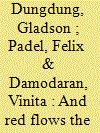

|
|
|
|
|
| Summary/Abstract |
This article documents Adivasi resistance to the ‘loot’ of their land and resources since 1980, especially during the Kalinganagar movement in Odisha, roughly between 2004 and 2010, and the Pathalgadi movement in Jharkhand, between 2016 and 2018. Using the lens of trauma and testimony, the article represents a combined effort by Gladson Dungdung, an Adivasi activist, journalist, and writer who has borne witness to events during these years; Felix Padel, an anthropologist; and Vinita Damodaran, a historian. The land grabs are mainly oriented towards mining and metals production, justified in terms of ‘development’, which leaves many dead and destroys landscapes that Adivasis have cared about for countless generations.
|
|
|
|
|
|
|
|
|
|
|
|
|
|
|
|
| 2 |
ID:
098879
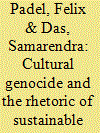

|
|
|
|
|
| Publication |
2010.
|
| Summary/Abstract |
In mining projects and metal factories proliferating in tribal areas of eastern central India, a gross disparity is evident between the dispossession and violence experienced by tribal communities on the one hand, and the rhetoric of 'sustainable development' put out by mining companies through public relations companies and the media on the other. While a large section of India's middle classes accept and identify with this rhetoric, grassroots movements of resistance to industrial displacement are gathering strength. 'Sustainable mining' is a concept promoted by mining companies through the International Council on Mining and Metals through its Mining, Minerals and Sustainable Development report. Yet long-term sustainability is the essence of the tribal communities being dispossessed of their land and resources, and a 'reality gap' exists between the rhetoric of development and events on the ground. Poverty is increasing, and 'cultural genocide' is a fitting description of the displacement process experienced by hundreds of tribal communities, while the war against the Maoists is in many ways a classic 'resource war'.
|
|
|
|
|
|
|
|
|
|
|
|
|
|
|
|
| 3 |
ID:
128876
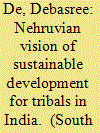

|
|
|
|
|
| Publication |
2014.
|
| Summary/Abstract |
As the first Prime Minister of India, Nehru pursued a policy of rapid industrialisation and national development, largely equated with economic growth and surplus. He once said that dams are the temples of modern India and claimed that big dams would address India's hunger and poverty. However, such development agenda also created much pain and suffering for the owners/users of land sacrificed in the public interest, mostly the indigenous people of India (Adivasis). This article critically analyses the impact of development policies on the Adivasi peoples of India, earlier and today. It argues specifically that Nehru's well-sounding development concept of Panchsheel, the 'Five Pillars of Tribal Development', did not work for the Adivasis and largely ruined their own efforts to secure sustainable development.
|
|
|
|
|
|
|
|
|
|
|
|
|
|
|
|
| 4 |
ID:
159385
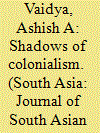

|
|
|
|
|
| Summary/Abstract |
This paper examines the status of tribal communities in central India through the lens of structural violence. In the process, a new and normatively grounded definition of violence is put forward which addresses weaknesses in the original definition proposed by Johan Galtung. The paper connects this new definition of structural violence to developmentalist and capitalist ideology, frameworks that benefit tribal communities by some empirical measures, but which must be recognised as profoundly violent in the normative contexts of those communities. Adivasis are caught between the competing imperatives of the Indian state's different and overlapping stages of modernist development: the remnants of the old colonial ‘civilising’ mission, a post-colonial nationalist industrialism and a post-industrial urge toward conservation. I argue that Galtung's definition is ill-suited to the task of describing this type of post-colonial structural violence, and that my definition solves this problem by accounting for the violence of conflicting normative frameworks.
|
|
|
|
|
|
|
|
|
|
|
|
|
|
|
|
| 5 |
ID:
187290
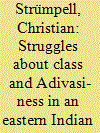

|
|
|
|
|
| Summary/Abstract |
In the eastern Indian steel town of Rourkela, Adivasis are widely stereotyped as uneducated, jangli (‘wild’), and drinkers, and they are therefore held to make for a special type of worker. Their Adivasi ‘nature’ makes them an ideal fit for facing the heat, dust, and fumes in the so-called ‘hot shops’ of the local public-sector steel plant. It is also said that Adivasis are, in fact, not well suited for the permanent and well-paid jobs the public-sector steel plant provides, and that they are better employed as contract workers who are paid little and by the day, and on whom the industry has increasingly relied since the 1970s. Critically engaging with Bourgois’ concept of ‘conjugated oppression’, I will show how these casteist stereotypes entrench the class position of Adivasis in the local steel industry, but also how this position has nevertheless changed over time—for some for the better, for many for the worse. Furthermore, although this polarization is driven by larger political economic changes it is exacerbated by the ways in which the better-off among the stereotyped Adivasi workers respond to them. This calls, I argue, for close attention to be given to the historical dynamics in the relations between class and caste (or ‘tribe’) and in the struggles related to them.
|
|
|
|
|
|
|
|
|
|
|
|
|
|
|
|
| 6 |
ID:
187289
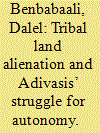

|
|
|
|
|
| Summary/Abstract |
Based on a case study of the Bhadrachalam Scheduled Area of Telangana, this article argues that the Adivasis of Central India seek autonomy as a response to their dispossession and to the accumulation of capital taking place in their resource-rich territories. The two main factors that have curtailed Adivasi autonomy through land alienation are analysed. The first is a process of agricultural colonization, wherein settlers belonging to agrarian dominant castes have moved into Adivasi territory and acquired tribal lands, thus dispossessing the original owners and reducing them to daily wage labourers. The second process is the industrialization of tribal areas where raw material is available and manpower is cheap, allowing for rapid accumulation through the exploitation of both nature and labour. Adivasis’ struggle for autonomy is therefore a way to reclaim control over their own resources and to preserve their distinct identity.
|
|
|
|
|
|
|
|
|
|
|
|
|
|
|
|
| 7 |
ID:
163587
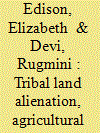

|
|
|
|
|
| Summary/Abstract |
This article, based on fieldwork, discusses the negative impacts of land alienation suffered by Adivasis in Attappady, a tribal block of Kerala in South India. Experiencing multiple alienations that have fundamentally affected their way of life, agricultural practices and food culture, tribals not only continue to suffer discriminatory treatment by non-tribal settlers, but also by state authorities’ restrictions of access to local forests and forest produce. These problems assume added significance as this ecologically important location in the Western Ghats of India is one of the eight ‘hottest hotspots’ of biological diversity in the world, while the traditional guardians of this environment have been completely disempowered. The article traces abuses of power in land alienation processes, analyses unequal power structures and argues that better appreciation of traditional tribal culture and its ecologically holistic approaches ought to inform policies for local sustainable development. This would help the tribals to safeguard their identity within the constraints of current conditions and enhance the prospects for sustainable preservation of the precious local natural resources and biodiversity.
|
|
|
|
|
|
|
|
|
|
|
|
|
|
|
|
| 8 |
ID:
114598


|
|
|
|
|
| Publication |
2012.
|
| Summary/Abstract |
Contemporary Indian feminism is concerned with a number of social justice issues, including the circumstances under which 'adivasis' or tribal people, live. India has a large body of work on these peoples, but much of this romanticises them and fails to treat them as the inhabitants of a modern, industrial and globalising India. In this article, I discuss two works published by Indian feminist presses that provide new and alternative ways of representing adivasis. Anita Agnihotri's Forest Interludes: A Collection of Journals and Fiction is a multi-genre collection that reflects the author's time spent as an IAS officer in adivasi regions of eastern India. Agnihotri plays the dual role of privileged outsider and informed insider, which lends her narrative a forceful authority. Bhaskaran's life story of the Keralite adivasi activist C.K. Janu, Mother Forest: The Unfinished Story of C.K. Janu, attempts to present adivasi politics as relevant to modern India, yet the formal structuring of the text and the stylistic choices made by the translator and editors undercuts this. Both Forest Interludes and Mother Forest contain formal and stylistic innovations and, though not without problems, they represent a promising departure from traditional literary representations of adivasis - a departure that situates these subaltern peoples within a more contemporary discursive field.
|
|
|
|
|
|
|
|
|
|
|
|
|
|
|
|
|
|
|
|
|